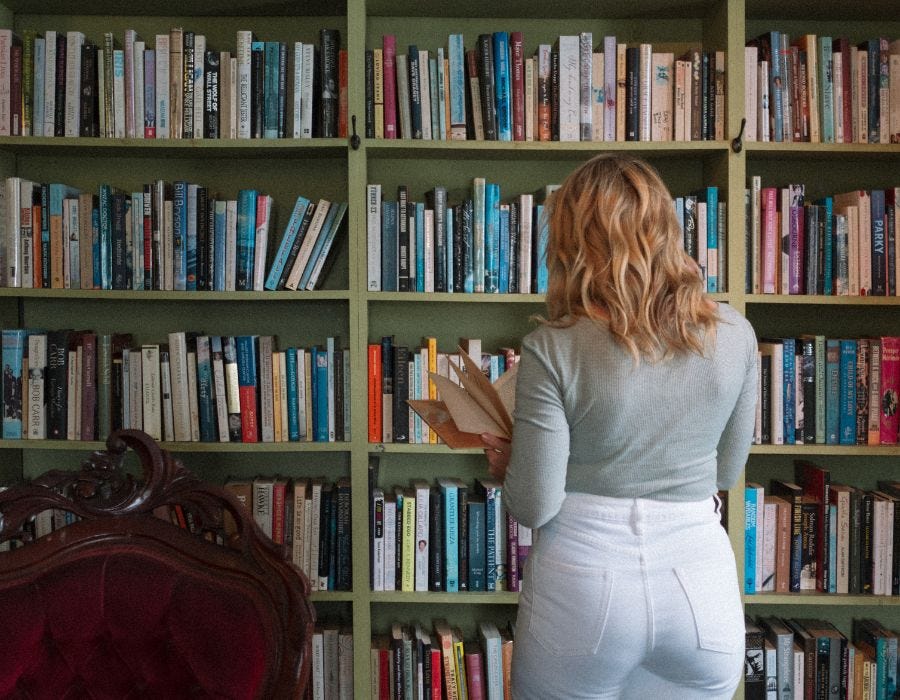Lucy Pearson on A Life Shaped by Stories
How a life-long obsession with books led Lucy to unexpected healing and a thriving career in bibliotherapy
I first heard of
when included one of Lucy’s magical bibliotherapy sessions on her holiday gift list. I was intrigued. More and more these days, you hear about how healing bibliotherapy can be for everything from a broken heart to loneliness to mounting stress about the world. I wanted to know more!So I’m delighted Lucy wrote this lovely essay for all of us about how she stumbled into bibliotherapy, how it helped her find renewed happiness and hope, and how it can help us, too!
Lucy has read her way through the BBC's Top 100 Books and is now tackling the NYT’s 100 Best Books of the 21st Century. She works with clients around the world, offering bespoke book prescriptions to help people enhance and improve their reading lives. In 2023, she launched Libraries Curated by Lucy, a service that helps homes, hotels, and wellness retreats source and style beautiful libraries. She writes
.Lucy lives in Bondi, Australia and is never happier than when she has a book in one hand and an ice-cold glass of prosecco in the other.
⭐️Lucy is generously gifting one reader one of her wonderful bibliotherapy sessions, The Constant Reader! If you’d like to be the lucky winner, please add “READER” after your comment. The winner will be chosen at random on Monday, April 7th and notified by Substack Direct Chat. I’m excited for all of you! ⭐️
A Life Shaped by Stories
I’ve always been a reader, though not because of one life-changing book or a particularly influential teacher—though I did have two, one in high school and one in college. My love for books wasn’t passed down through my family (my three sisters barely read), but somewhere along the way, stories became a part of me. Some, like Rebecca by Daphne du Maurier, have shaped the reader I am today, but the habit itself has always just been there—a steady presence, entirely my own.
My love for books is as innate as breathing—I’m never without one in hand, and I’m forever blathering on about books to anyone who will listen. And while I only came across the idea of bibliotherapy a few years ago—using books as a therapeutic tool—in a way it feels like something I’ve been doing my whole life.
I turn to books when I’m stressed, heartbroken, or in need of creative inspiration. When I want to escape (hello, pandemic!) or when I want to cozy up at home and shut out the chaos of what’s going on around me (current state of the world, anyone?). And while I used to think books were just a way to slip into another world when my own felt too complicated, too uncertain, bibliotherapy—reading with intention, and seeking books as a means of healing—changed that. It didn’t just distract me from life; it helped me live it better.
The first time I truly understood the power of books as a remedy for the soul, I had moved across the world for Ozzie, a man I had a six-day fling with one hot summer in Sydney. It didn’t work out; of course it didn’t. When he picked me up on the day I arrived, it became very clear I had made a mistake. Our dwindling contact in the months I was back in London—something I had chalked up to distance and work commitments—was, of course, a sign of his fading interest. My hopes that life would be a continuation of the six days we spent together were naive at best, reckless at worst.
Suddenly, I was alone in a country a million miles from home. Shame was my constant companion. It was white hot, a furnace. It followed me everywhere. His rejection of me sat heavy on my chest; like an uncomfortable, too-tight bra.
Not long after I arrived in Australia, he told me he was leaving for Vietnam—he wanted to travel, to see more of the world. I cried all afternoon, leaving my bed only to throw up until the bile of my stomach bubbled in the bottom of the toilet. The humiliation was total, it was concrete, I thought I might drown in it.
My instinct was to turn inward, to isolate. But there’s only so much self-pitying I could stomach. Instead, I turned to books—I wanted to see heartbreak and anguish laid bare in black and white. I craved the comfort of shared experience. I picked up The Year of Magical Thinking by Joan Didion, and for the first time, I felt like someone understood the shapeless, surreal nature of grief. Her words mirrored my own disorientation, my inability to make sense of what had happened. The way she examined grief with such precision, acknowledging its unpredictability, helped me feel less lost. Her book became a companion, one that made me realise—however trite it sounds—that I could survive the agony of a broken heart.
Then came Outrageous Openness by Tosha Silver, which helped me sit with discomfort and embrace impermanence, and to surrender instead of clinging to what wasn’t meant for me. My immediate reaction had been to leave Australia after things ended with Ozzie, but reading these books gave me pause. There's an often-quoted saying, "everywhere you go, there you are," and these books reminded me that the heartache would be with me, whether I stayed in Australia or not. Instead of going home—as tempting as it was—I began to sit with the discomfort, finding solace in the stories of others who had navigated similar pain. Books gave me a lifeline that made me realize healing wasn’t about erasing the past; it was about learning to carry it more lightly.
But it wasn’t until several years later—in the heavy days of lockdown—that I first came across the idea of bibliotherapy. The word comes from the Greek for ‘book’ (biblio) and ‘healing’ (therapeia), and the practice itself is an ancient one, where the therapeutic nature of books has been recognised for centuries. The ancient Greeks even carved ‘healing place of the soul’ above their libraries. But you needn’t be a Greek scholar to understand the restorative power of books.
I’ve always been quick with a book recommendation, but during lockdown, my DMs went into overdrive. Not because I was particularly zen about the whole thing—far from it—but because, like many people, I was permanently online, and begun to share books that had helped me make sense of the world. Some people suddenly had endless time on their hands, while others were climbing the walls with restlessness, fear, or grief. Either way, I was happy to oblige.
I recommended Tiny Beautiful Things by Cheryl Strayed to a friend who felt like life had been put on hold—her collection of letters, filled with wit and wisdom was a reminder that even in limbo, there’s still beauty to be found. Wintering by Katherine May was my go-to for those struggling with the heaviness of it all. For some, I’d recommend they read a book they loved as a teen (for me that was Judy Blume, Lois Lowry, and Francine Pascal), and there was the oft-recommended The Shell Seekers for anyone in need of the literary equivalent of a long summer holiday.
Each time I recommended a book, it felt like a reminder that even when the world felt small, stories could still take us somewhere.
This, for me, is the heart of bibliotherapy: connection. Books can make us feel less isolated, less lost. They reflect our struggles back at us and, in doing so, help us navigate them. I don’t just read for pleasure anymore; I read to understand, to grow, to steady myself when everything else feels uncertain.
I could map my life through the books that have shaped me—the university bedroom where I stayed up into the early hours of the morning finishing Beloved, the library I visited every weekend as a child, where I devoured The Babysitters Club, Sweet Valley High, and everything Judy Blume ever wrote. The theatre corner where I wailed my way through A Little Life, the café in Bali where The Monk Who Sold His Ferrari finally made sense. The street where I ate watermelon while Elizabeth Gilbert signed my copy of Big Magic.
Over time, my bookshelves have become more than just a collection. They’re a record of where I’ve been, what I’ve needed, and the stories that have kept me company along the way.
These days, I help people find guidance, comfort, and inspiration through books. Some come to me in a reading slump, others want to tackle classics but don’t know where to start. Bibliotherapy is more than just recommending books—it’s about understanding each person’s story, and their relationship with reading.
But books aren’t just a source of emotional support—they’re full of practical wisdom too. I often recommend On Writing by Stephen King, Bird by Bird by Anne Lamott, and The Writer Before the Page by Toni Morrison to fellow creatives. Memoirs, philosophy, and poetry (which I once dismissed as pretentious until Langston Hughes—and a particularly handsome author who insisted I read him—changed my mind) can offer unexpected moments of clarity and peace.
My bibliotherapy practice starts with a conversation—about reading habits, life circumstances, and what someone is looking for, whether it’s comfort, motivation, or a fresh perspective. From there, I create a personalized reading prescription, drawing from fiction, nonfiction, essays, even children’s books if they fit. Some of the most rewarding moments come when a book truly lands. I once recommended Sagittarius by Natalia Ginzburg to someone struggling to focus on reading—and she devoured it in a single sitting. Another client, grieving a parent, found solace in Poorna Bell’s In Search of Silence.
Not every book will land at every stage of life. Some of my favourites took multiple attempts before they finally clicked. Just as a book that felt transformative in your twenties might seem irrelevant in your forties, or one that didn’t move you last year might suddenly feel profound. Such is the magic of reading.
And you need not be a bibliotherapist nor an avid reader to experience the benefits of books. Reading with intention—whether once a week, or once a year, and choosing books that align with your emotional or mental state—can be powerful. Keeping a reading journal helps. Revisiting old favourites can offer new insights. Exploring different genres and authors will broaden perspective, while joining a book club or attending a reading retreat (shameless plug—I’m hosting three this year!) will deepen your connection to books.
Bibliotherapy has reshaped both my reading habits and my approach to life. And sometimes, the wisdom we’re searching for isn’t found in grand gestures or big decisions—but in the quiet, unassuming pages of a book.
If you enjoyed this essay by Lucy, you might also like this one by
:










Love this! Biblio-therapy! We did it a bit with our bookstore in Mexico. People, often tourists, would come in, often out of curiosity as the town is very small, wander about, looking for something to read (beach towns can get boring). So after chatting a bit, I'd try to fit them with a book. On 2 couple occasions people came back to me later and said it got them started on reading again. Made me feel good. It's so fun to share reading material ideas.
Someone to prescribe books that meet me where I am and help me grow? Yes, please! Reader!